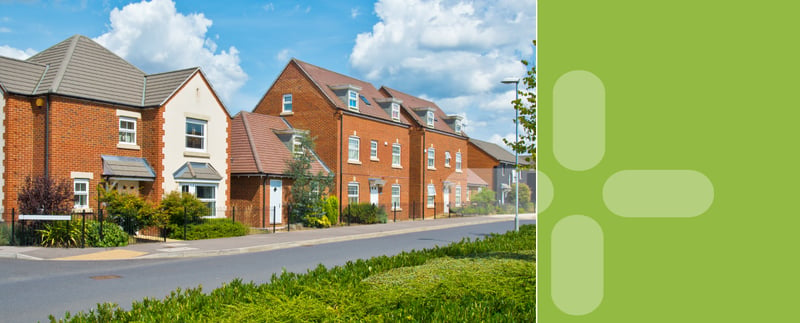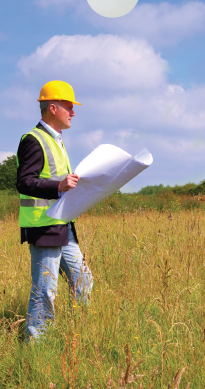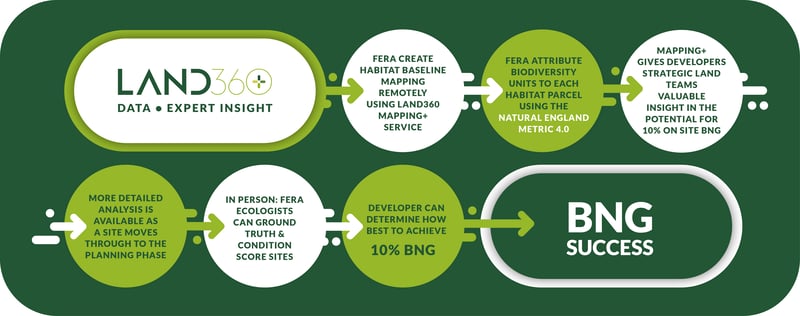Biodiversity Net Gain (BNG) legislation is a significant step forward in the conservation and restoration of our natural environment in England. It represents a commitment to ensuring that development projects leave our ecosystems healthier than before.
In this blog, Paul Brown (read more about Paul here) shares how successful implementation of BNG requires a deep understanding of ecological systems, which is where expert ecologists play a pivotal role.

What do you need to know about BNG?
Ultimately housing developers will be penalised if they do not achieve BNG. If they fail to account for BNG in their plans, these plans could meet with delays or rejection of their planning applications, so getting credible advice is vital.
It’s also important to remember that the net gains need to be met and maintained for the next thirty years, so benchmarking accurately to obtain robust data and getting credible advice to make effective plans is crucial.
Legislation indicates that the minimum of 10% gain in biodiversity needs to be achieved, but many local authorities already require more than this.
"BNG is fast approaching so there has never been a more important time for developers to map and benchmark site biodiversity"
- Paul Brown, Senior GI Remote Sensing Specialist, Fera Science
Who can help housing developers achieve biodiversity net gain?
Achieving BNG success requires a specific range of skills and because housing developers will need to defend plans with the planning officers in detail it’s vital developers work with suitably qualified experts.
These skills include an understanding of the following:
- Complexity of ecosystems: Ecologists are required to be well versed in understanding the complexity of ecosystems that are likely to be found in housing development sites. This is crucial when assessing how development projects might impact them and understanding the current condition of site habitats.
- Local knowledge: Given that biodiversity is not uniform, ecologists working with planners will appreciate the need to understand the local flora and fauna and what flora, for example, will be suited to the local climate or soil type.
- Accurate assessment: Measurement is key to achieving BNG. Therefore, planners need to be working with ecologists who have highly accurate skills and tools to ensure habitat data collection and baselining is thorough enough to help make accurate recommendations for uplifting biodiversity.
- Mitigation planning: Impacts on biodiversity from housing development is unavoidable, which is why mitigation measures come into play. Ecologists with relevant experience will be adept at designing and implementing effective mitigation plans which not only offset losses but also look to enhance local biodiversity.
- Legal compliance: Given the new and complex legal framework around BNG, relevant experience in how to improve biodiversity within the context of housing laws and regulations play a vital part in providing sound housing applications.
What can housing developers do now?
Given that the Natural England Metric 4.0 is the standard biodiversity accounting tool to be used for calculating BNG, it’s advisable for developers to familiarise themselves with the tool; you do not need to be a qualified ecologist to do this.
Developers will then be required to enlist appropriately qualified advisers once BNG legislation becomes mandatory in England from February 2024.
The Natural England Metric 4.0, coupled with guidance from Defra, were both created to provide BNG structure, but you need to be experienced in relevant ecology to interpret ecological data as well as have surveying and mapping knowledge.
How can Fera help developers achieve biodiversity net gain?
Fera Science have an expert team dedicated to BNG that includes ecologists as well as economists, geographic information system (GIS) and remote sensing experts.
They work together to provide a range of services to support developers in their efforts to enhance nature and biodiversity.
LAND360 is a science-based land-assessment service delivered by Fera Science’s team of experts.
The service can support developers at a strategic land stage in their efforts to enhance nature on development sites and understand if potential sites can support on site BNG or if offsetting is going to be required, as well as plan how to uplift biodiversity.
LAND360 can work with data from Metric 4.0 by:
- Conducting habitat assessments and biodiversity unit attribution using remote sensing technology, mapping, geographic information systems (GIS) and NE Metric 4.0 – desk based. This is especially useful for strategic land departments.
- This insight is then paired with expert advice from Fera to help housing developers understand the potential of their sites to meet net gains in biodiversity of at least 10% and create a benchmark to track and evidence progress from.
- From here, the LAND360 team can make best practice recommendations on actions to improve habitats that will maintain the increased BNG for a duration of 30 years or more.
- LAND360 can also support at the planning phase, using on site ecology survey combined with the desk-based study to sense check and condition score habitats for planning applications.

To find out more about how Fera can provide a range of services to support developers in their efforts to enhance nature and biodiversity, click here.
More about LAND360
LAND360 is Fera's cutting-edge natural capital assessment service. Launched in 2022, it empowers farmers, landowners, estate managers, and housing developers to make informed land use decisions. By accurately measuring and mapping existing land habitat features and modelling biodiversity offerings, LAND360 is a vital tool in the quest for sustainable development and biodiversity enhancement.
